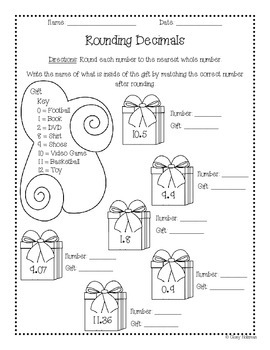Rounding Decimals Practice for Grade 5 Students

Welcome to our comprehensive guide on rounding decimals tailored for Grade 5 students! Rounding numbers is a crucial mathematical skill that simplifies calculations, making it easier to understand and work with numbers. Today, we will explore how to round decimals to the nearest whole number, tenth, or hundredth, providing you with clear examples and practical exercises.
Understanding Decimals and Place Value

Before diving into rounding, let's ensure a firm grasp on what decimals are and the concept of place value.
- Decimal Point: The point that separates the whole number part from the fractional part.
- Place Value: Each position to the right of the decimal point represents a different power of 1/10:
- The first digit to the right of the decimal is the tenths place (1/10).
- The second is the hundredths place (1/100).
- The third is the thousandths place (1/1000), and so on.
Visualizing Place Value

Here is how we visually represent the place value for the number 14.357:
| Hundreds | Tens | Units | Decimal Point | Tenths | Hundredths | Thousandths |
|---|---|---|---|---|---|---|
| 0 | 1 | 4 | . | 3 | 5 | 7 |

The Process of Rounding Decimals

Rounding decimals involves choosing the closest number in a specified position. Here are the steps:
- Identify the rounding digit: Decide which place value you're rounding to.
- Look at the digit to the right:
- If this digit is 5 or greater, increase the rounding digit by one.
- If it's less than 5, keep the rounding digit as is.
- Set the following digits to zero: All digits to the right of the rounding digit become zero, or for decimals, they are dropped entirely.
Examples of Rounding

Let's practice with some examples:
- Rounding 3.76 to the nearest whole number:
- Identify the digit to be rounded: 3.76 → Rounding digit is 3 (Units place).
- The digit to the right is 7, which is greater than 5, so we round 3 to 4.
- Result: 3.76 becomes 4.
- Rounding 4.23 to the nearest tenth:
- Identify the rounding digit: 4.23 → Rounding digit is 2 (Tenths place).
- The digit to the right is 3, which is less than 5, so 2 stays the same.
- Result: 4.23 becomes 4.2.
- Rounding 1.654 to the nearest hundredth:
- Identify the rounding digit: 1.654 → Rounding digit is 5 (Hundredths place).
- The digit to the right is 4, which is less than 5, so 5 stays the same.
- Result: 1.654 becomes 1.65.
💡 Note: Remember, when rounding to whole numbers, you can use "5 or more, let it soar" as a mnemonic to decide whether to round up or not.
Practice Exercises

Here are some exercises for you to practice rounding decimals:
- Round 2.46 to the nearest tenth.
- Round 3.856 to the nearest hundredth.
- Round 1.2345 to the nearest thousandth.
- Round 8.99 to the nearest whole number.
Try these examples and then check your answers:
- 2.46 rounded to the nearest tenth: 2.5
- 3.856 rounded to the nearest hundredth: 3.86
- 1.2345 rounded to the nearest thousandth: 1.235
- 8.99 rounded to the nearest whole number: 9
Applications of Rounding Decimals

Rounding decimals isn't just for math class; it's applicable in everyday life:
- Financial Calculations: When dealing with money, rounding can make calculations simpler. For instance, if you're splitting a bill, rounding can help estimate individual contributions.
- Measurement Conversions: Converting units might require rounding to a sensible place value, like tenths or hundredths, to make the number more manageable.
- Data Analysis: Rounding can help summarize data in tables or graphs, making the information clearer and more digestible.
Rounding in Real-Life Scenarios

Consider the following real-life examples:
- If a store item costs $4.99, rounding it to $5.00 might help when you're quickly trying to calculate if you have enough money.
- When baking, a recipe might call for 3.8 grams of an ingredient. Rounding this to 4 grams can simplify the measurement process.
🧮 Note: When working with financial transactions, always check if rounding is legally acceptable or if exact values are required.
In summary, understanding how to round decimals is not only an essential part of Grade 5 math curriculum but also a practical skill for everyday scenarios. By grasping the basics of decimals and place value, then applying the step-by-step method for rounding, students can enhance their numerical proficiency and make decisions more quickly in various contexts.
What does rounding to the nearest tenth mean?

+
Rounding to the nearest tenth means looking at the hundredth place. If it’s 5 or more, the tenth place increases by one; otherwise, it stays the same.
Can rounding ever change the value of a number significantly?

+
Yes, it can. Depending on how far you round, small changes can become significant, especially in financial contexts where accuracy matters.
Is there a difference in rounding when dealing with negative numbers?

+
No, the process of rounding remains the same for positive and negative numbers; you just round the digits normally.
Related Terms:
- Rounding decimals worksheets with answers
- Rounding decimals worksheet grade 4
- Rounding decimals Worksheet grade 7